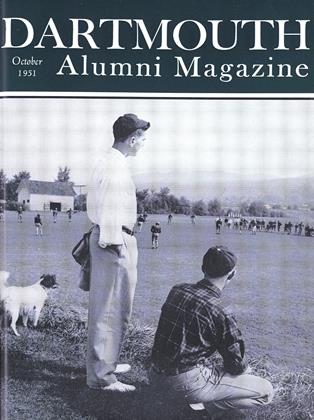by Richard Eberhart,'26. Oxford University Press: New York,1951, 86 pp., $2.50.
It is a comment on our civilization, rather than on Dartmouth College in particular, that among all those living who hold its A. B. degree, the man who has attained recognition not only in this country but in England among lovers of literature, and whose work shows most signs of durability, should be known to comparatively few of the faculty, few of the alumni, and almost none of the undergraduates. I refer, of course, to the poet Richard Eberhart. It is the perspicacity of the Press of the University of Oxford which has sponsored Eberhart for many years.
To all whose affection for Dartmouth comprises a pleasure in the arts professed there, the present Selected Poems is an admirable introduction to Eberhart. Here, in lines always vigorous (and if occasionally rough, of an intended and carefully disposed roughness), is the record of the struggle of a human mind and sensibility with an ambiguous antagonist, like him whom Jacob encountered at the ford. The unknown wrestler may be angelic; he is assuredly mysterious and mighty. Is his name Death? Sometimes, as in "The Groundhog," Eberhart's most widely anthologized poem. Is his name audible only in some dimension beyond death, beyond space, beyond time? A syllable of the Possible Absolute? This poetry is evidently metaphysically strenuous.
One trophy Eberhart has won—and won as a poet in these poems, wherever and however else he may have done so: the conviction that "action must be learned from the love of man." An especially vivid and moving celebration of this creed is the closing poem in alliterative verse, "Brotherhood of Man," recording the victory of human nature amid the horrors undergone by the American soldiers who became prisoners of the Japanese on Bataan.
 View Full Issue
View Full Issue
More From This Issue
-
 Article
ArticleTHE COLLEGE
October 1951 By C.E.W. -
 Article
ArticleThe Moral Supports or Education
October 1951 By C.E.W. -
 Class Notes
Class Notes1918
October 1951 By ERNEST H. EARLEY, DONALD L. BARR -
 Article
ArticleDr. Percy Bartlett '00m
October 1951 By FREDERIC P. LORD '98 -
 Class Notes
Class Notes1950
October 1951 By ENS. SCOTT C. OLIN, USN, SIMON J. MORAND III -
 Article
ArticleAssociated School News
October 1951 By Karl Hill
F. Cudworth Flint
-
 Books
BooksBEAU-POIL AU MAROC
June 1940 By F. Cudworth Flint -
 Books
BooksTHE LANGUAGE OF POETRY,
May 1942 By F. Cudworth Flint -
 Books
BooksBROTHERHOOD OF MEN
July 1949 By F. Cudworth Flint -
 Feature
FeatureKenneth Allan Robinson
February 1962 By F. CUDWORTH FLINT -
 Books
BooksTHE MODERN CRITICAL SPECTRUM.
DECEMBER 1962 By F. CUDWORTH FLINT -
 Books
BooksTHE GEORGIAN REVOLT: RISE AND FALL OF A POETIC IDEAL, 1910-1922.
NOVEMBER 1965 By F. CUDWORTH FLINT
Books
-
 Books
BooksWine of Fury
November, 1924 By Eric P. Kelly -
 Books
BooksFACULTY PUBLICATIONS
January 1918 By JAMES FAIRBANKS COLBY -
 Books
BooksDOCTOR DESTINY
June 1947 By John F. Gile '16 -
 Books
BooksTHE PETTY OFFICER'S GUIDE
March 1953 By Lt. David G. Muller, USN -
 Books
BooksTHE WAR AGAINST POETRY.
MAY 1971 By PETER SACCIO -
 Books
BooksPHILOSOPHY, SCIENCE, AND SENSE PERCEPTION.
OCTOBER 1965 By TIMOTHY J. DUGGAN

